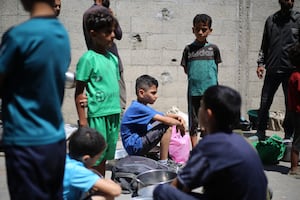In a small, dimly lit room in northern Gaza, Ahmad Al Ghalban, 16, lies on a mattress he cannot get up from.
Just a few months ago, he was sprinting down football fields, laughing alongside his twin brother Mohammed. Now, he is without both legs, and his brother was killed in the same air strike that tore Ahmad's life apart.
“I used to love walking, moving, playing. Now, I can't move from where I sit,” Ahmad told The National, his voice heavy with grief and disbelief. “I never imagined I would reach a state like this.”
Like thousands of children in the Gaza Strip, Ahmad is not only wounded by the physical violence of Israel's war but is also battling the silent, lingering pain of trauma and loss. What makes survival possible, in many cases, is something both fierce and fragile: the unwavering love of parents who refuse to let their children surrender to despair.
Ahmad’s mother calls him “my hero” and tells him that one day, he will walk again. She speaks of prosthetic limbs and restored dreams, feeding hope even where there is deep exhaustion. “Sometimes her words give me strength,” Ahmad says. “Other times, I feel helpless. But they never leave me. They always try to lift me up.”
Sight lost
In another part of Gaza, Mohammad Emad Ghanem, 11, performs the same heartbreaking ritual every morning. After waking up, he covers his left eye with his hand and tries desperately to see through his right. He lost that eye in an explosion several months ago.
“He still tests himself every day, hoping his sight might come back,” his father, Emad Ghanem, told The National. “He’s just a child, and yet he understands everything. He knows what it means to be different, to feel alone.”
Before the war, Mohammad’s life was filled with laughter, games and school. Now, his parents spend hours each day reminding him that his injury does not define him, that he is no less capable or worthy than any other child.
“We keep telling him that one day he’ll travel, get treatment, and regain his sight,” Emad says. “We’re planting in him the belief that no injury will stop him from achieving his dreams.”

Mohammad Khaled Hijazi, eight, was also playing near his destroyed home in Jabalia refugee camp when an unexploded ordnance detonated, sending shrapnel into his right eye. His father, Khaled, remembers the moment vividly, not so much the explosion itself but what came afterwards: the silence, the questions, and the quiet ache of a son asking things no parent can easily answer.
“Dad, when will I see with both eyes again?”
“Will I be like my cousins and my friends again?”
“Every time he asks, my heart breaks,” Khaled said. “But I always answer: ‘One day, you will.’”
Despite their own trauma and daily hardship, Khaled and his wife have committed themselves to nurturing their son’s confidence and self-worth. They refuse to let him be swallowed by self-pity or shame.
“Just a few days ago, he asked me: ‘What’s the farthest thing you can see on the street?’” Khaled recalls. “I pointed to a red car. He said: ‘I can see it too!’ And he smiled. That moment, it shook me. It reminded me how fragile and brave he is.”
In a place where food is scarce, water is limited, and electricity is unreliable, emotional survival can be harder than physical endurance. Parents in Gaza are not just providers, they are emotional anchors, counsellors and protectors against a world their children can no longer fully make sense of.
The loss of a limb, an eye, a sibling, these are wounds that reshape a child's entire future. But behind every child trying to cope is a parent working just as hard, often silently, to carry their pain and remind them that life still has meaning.
“We know we can’t bring back what’s lost,” says Emad Ghanem, “but we can be there. Every single day. We can keep telling our children that they are not broken, that they are strong, that they are loved.”
“It's not an easy task to find yourself trying to convince your child that tomorrow will be better, given what we're actually experiencing, but they are children, and they deserve hope,” Khaled Hijazi said.



